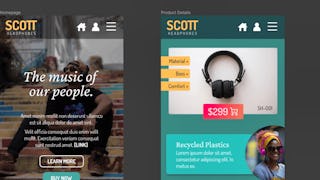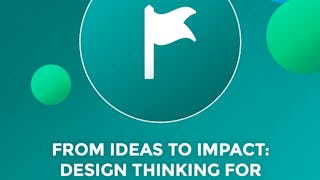- Browse
- Machine Design
Machine Design Courses Online
Explore machine design principles for creating mechanical systems. Learn about design processes, material selection, and engineering analysis.
Explore the Machine Design Course Catalog
 G
GGoogle Cloud
Skills you'll gain: Generative AI, MLOps (Machine Learning Operations), Continuous Monitoring, Predictive Modeling, Data Validation, Responsible AI, Google Cloud Platform, System Monitoring, Machine Learning Methods
Intermediate · Course · 1 - 4 Weeks
 Status: NewNewStatus: Free TrialFree Trial
Status: NewNewStatus: Free TrialFree TrialSkills you'll gain: Figma (Design Software), Prototyping, Responsive Web Design, UI Components, Mockups, User Interface (UI) Design, User Experience, Interactive Design
Mixed · Course · 1 - 3 Months
 Status: NewNewStatus: Free TrialFree Trial
Status: NewNewStatus: Free TrialFree TrialSkills you'll gain: Unreal Engine, Animation and Game Design, Video Game Development, Computer Graphics
Mixed · Course · 1 - 4 Weeks
 Status: Free TrialFree TrialU
Status: Free TrialFree TrialUUniversity of Lausanne
Skills you'll gain: Public Health, Health Policy, Community Health, Health Disparities, Governance, Health Systems, Policy Development, Environmental Policy, Social Determinants Of Health, Health Assessment, Systems Thinking, Sustainable Development
Intermediate · Course · 1 - 3 Months
 Status: PreviewPreviewI
Status: PreviewPreviewIIE Business School
Skills you'll gain: Design Thinking, Innovation, Business Solutions, Human Centered Design, Problem Solving, User Experience Design, Case Studies, Brainstorming, Team Oriented, User Research, Ideation, Creativity
4.6·Rating, 4.6 out of 5 stars19 reviewsBeginner · Course · 1 - 4 Weeks
 Status: Free TrialFree Trial
Status: Free TrialFree TrialSkills you'll gain: Wireframing, Persona (User Experience), User Experience Design, User Centered Design, Usability, UI/UX Research, User Research, Prototyping, Interactive Design, Design, User Flows, Mockups, Ideation
Intermediate · Course · 1 - 3 Months
 Status: FreeFree
Status: FreeFreeSkills you'll gain: Graphic and Visual Design, Graphic Design, Graphic and Visual Design Software, Adobe Photoshop, Creative Design, Typography, 3D Modeling, Color Theory, Visualization (Computer Graphics), Color Matching, Computer Graphic Techniques
Intermediate · Guided Project · Less Than 2 Hours
 Status: Free TrialFree Trial
Status: Free TrialFree TrialSkills you'll gain: Data Warehousing, Google Cloud Platform, Big Data, Apache Spark, Database Management, Data Integration, Dataflow, SQL, Data Pipelines, Metadata Management, Data Management, Real Time Data, Tensorflow, Data Science, Command-Line Interface, Applied Machine Learning, Cloud-Based Integration, Apache Hadoop, Query Languages, Machine Learning
4.3·Rating, 4.3 out of 5 stars125 reviewsIntermediate · Specialization · 1 - 3 Months
 Status: NewNewStatus: Free TrialFree Trial
Status: NewNewStatus: Free TrialFree TrialSkills you'll gain: Extract, Transform, Load, Apache Spark, Data Pipelines, PySpark, Apache Hadoop, Data Transformation, MySQL, Data Manipulation, Java Platform Enterprise Edition (J2EE), Data Store, Data Import/Export, Development Environment, Software Installation, System Configuration
Mixed · Course · 1 - 4 Weeks
 Status: Free TrialFree Trial
Status: Free TrialFree TrialSkills you'll gain: API Design, Restful API, API Gateway, Application Programming Interface (API), Cloud API, Application Lifecycle Management, Enterprise Application Management, Proxy Servers, Software Documentation, Authentications, Authorization (Computing)
4.7·Rating, 4.7 out of 5 stars2.4K reviewsBeginner · Course · 1 - 3 Months
 G
GGoogle Cloud
Skills you'll gain: Data Presentation, Data Visualization Software, Query Languages, Data Integration, Data Analysis
Beginner · Project · Less Than 2 Hours

Skills you'll gain: User Story, Design Thinking, User Experience Design, User Interface (UI) Design, Usability, Persona (User Experience), Mockups, Storyboarding
Beginner · Guided Project · Less Than 2 Hours
Machine Design learners also search
In summary, here are 10 of our most popular machine design courses
- Machine Learning Operations (MLOps) with Vertex AI: Model Evaluation - Português Brasileiro: Google Cloud
- Figma UI UX Design Essentials Pt.2: Layout & Components: Skillshare
- Unreal Engine: Design Dynamic Particle Effects for Games: EDUCBA
- HEALTHY URBAN SYSTEMS - PART 3 : Design and policies: University of Lausanne
- From Ideas to Impact: Design Thinking for User-Centricity: IE Business School
- Discovery and Low-Fidelity Design with Sketch and Miro: Coursera
- 3D Models with Adobe Photoshop: Design a Pickleball Paddle: Coursera
- Hands-on Foundations for Data Science and Machine Learning with Google Cloud Labs: Google Cloud
- Apache Spark: Design & Execute ETL Pipelines Hands-On: EDUCBA
- API Design and Fundamentals of Google Cloud's Apigee API Platform: Google Cloud










